Generative Use Cases of AI in Healthcare: Innovations Saving Lives
Table Of Content
Published Date :
04 Aug 2025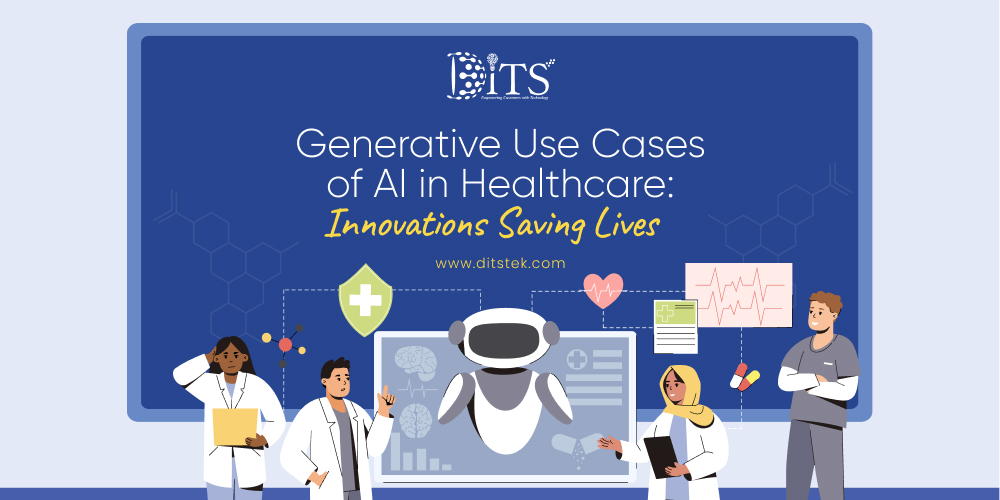
Generative AI in healthcare refers to a branch of artificial intelligence that creates realistic, synthetic data by learning from existing medical information. Unlike traditional AI systems that rely on fixed rules or historical data to make predictions, Generative AI can create new content, text, images, simulations, even synthetic medical data, based on patterns it learns from massive datasets. In the context of healthcare, this means AI systems that can generate clinical notes from conversations, simulate patient cases, or even design potential drug compounds.
By leveraging this technology, healthcare providers can improve the precision of care, boost efficiency, and lower overall costs, all while delivering better outcomes for patients. In this post, we’ll explore real-world use cases of generative AI in healthcare, showing how it's solving systemic challenges and creating business value.
Generative AI in Healthcare Market
The generative AI in healthcare market is experiencing exponential growth. By 2030, artificial intelligence (AI) is projected to save the U.S. healthcare industry over $150 billion annually. A major contributor to this transformation? The generative AI healthcare market is expected to reach more than $17 billion by 2032, with a CAGR of 34.4%. The demand is driven by its ability to improve clinical workflows, reduce operational inefficiencies, and deliver personalized care. As both public and private healthcare systems push for digital transformation, investing in generative AI is becoming a strategic imperative for business owners and administrators alike.
Are outdated systems holding you back? Gen AI is the Solution!
Partner with us to bring scalable, compliant, and human-centered AI solutions into your healthcare workflow.
Generative AI in Healthcare Examples
Across the globe, healthcare systems are experimenting with innovative implementations of generative AI. For instance, Nuance’s Dragon Ambient experience helps clinicians generate real-time notes from voice input, while Mayo Clinic is piloting AI-driven chat assistants to streamline patient communication. In drug discovery, a drug manufacturer used generative AI to create a novel compound in just 46 days. These generative AI in healthcare examples are proving that the technology is not just feasible, it’s transformative.
Why Healthcare Needs Generative AI Now
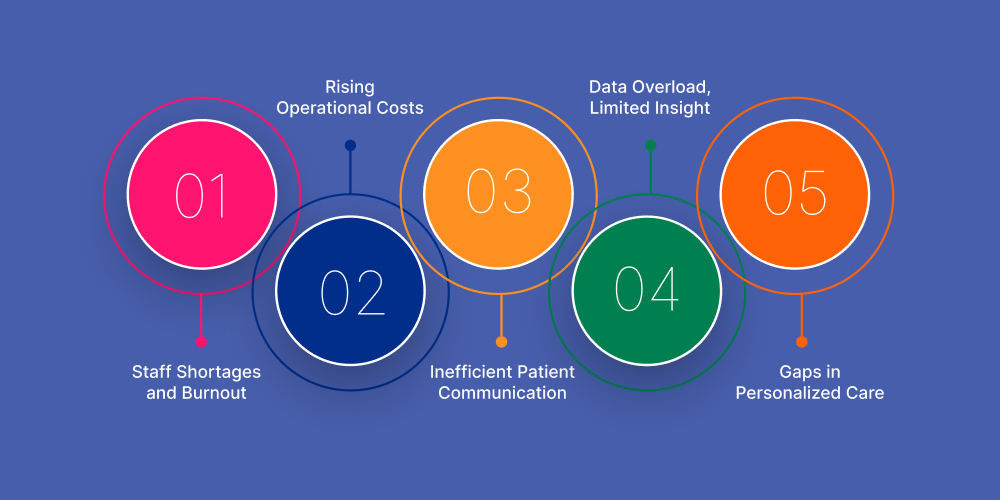
The healthcare industry is at a critical inflection point. Rising costs, staff shortages, and growing patient expectations are putting immense pressure on providers, administrators, and care delivery systems. Generative AI in healthcare use cases is emerging as a catalyst for innovation, solving problems that traditional tools struggle with. Here are the significant challenges healthcare organizations are facing without using generative AI.
1. Staff Shortages and Burnout
Healthcare systems around the world are facing severe workforce shortages. Clinicians are spending more time on paperwork than on patient care, leading to burnout and job dissatisfaction. Generative AI tools can help by automating time-consuming tasks like documentation, transcriptions, and report writing, freeing up time for healthcare professionals to focus on what matters most: patients.
2. Rising Operational Costs
With administrative costs eating up nearly 25% of healthcare spending, hospitals and clinics are under pressure to become leaner and more efficient. Generative AI can reduce these costs through intelligent automation in areas like billing, claims processing, and patient communication—helping organizations do more with less.
3. Inefficient Patient Communication
Patients today expect fast, clear, and personalized communication, but many healthcare systems still rely on outdated channels. Generative AI can power conversational chatbots, virtual assistants, and automated follow-up systems that enhance engagement, reduce no-shows, and provide timely answers to patient queries 24/7.
4. Data Overload, Limited Insight
Healthcare generates vast amounts of data every second—from electronic health records (EHRs) to lab results, imaging scans, and wearable devices. The challenge is making sense of it all. Generative AI excels at summarizing complex datasets, identifying patterns, and generating actionable insights to support clinical decision-making.
5. Gaps in Personalized Care
Patients aren’t one-size-fits-all, yet many treatment plans still rely on generalized protocols. Generative AI can synthesize data from multiple sources to help clinicians create individualized care plans based on a patient's history, genetics, and current condition—moving healthcare toward truly personalized medicine.
In short, the healthcare landscape has reached a point where incremental improvements are no longer enough. Generative AI offers a transformational leap, enabling providers to deliver faster, smarter, and more personalized care at scale.
Build Future-Ready Healthcare Apps with Generative AI Precision!
Transform diagnostics, patient engagement, and clinical workflows with tailor-made generative AI models built by healthcare tech specialists.
What Generative AI Brings to the Table
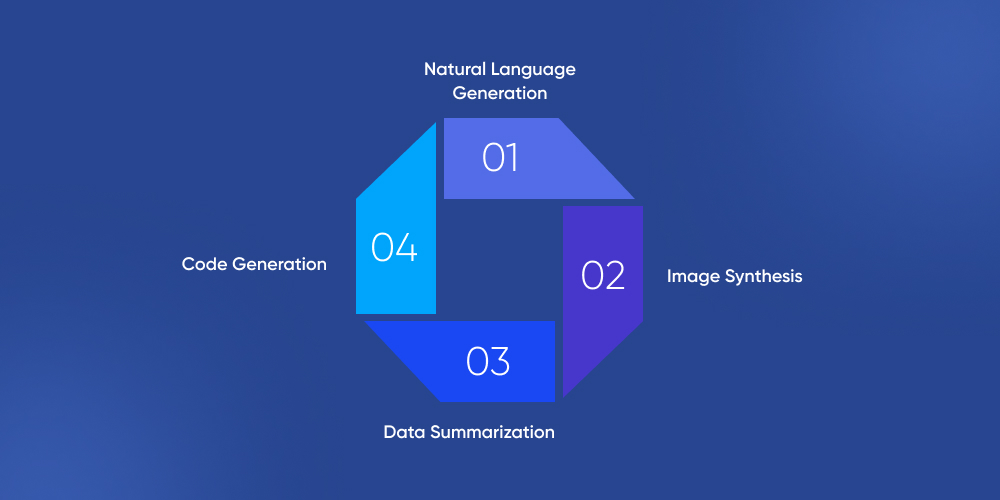
Generative AI is a powerful toolkit designed to solve some of healthcare’s toughest challenges. But what exactly does it do, and why should healthcare business owners care?
Core Capabilities
Generative AI is capable of producing entirely new content based on the data it’s trained on. In healthcare, this includes:
- Natural Language Generation: Turning raw clinical data or conversations into structured summaries, discharge notes, or patient instructions.
- Image Synthesis: Enhancing medical images (like MRIs or CT scans), generating synthetic images for training purposes, or even filling in missing scan data.
- Data Summarization: Quickly condensing long patient records or research findings into concise, actionable insights for clinicians.
- Code Generation: Writing backend scripts for automating workflows or integrating healthcare software with minimal manual effort.
These capabilities allow AI to act as a “co-pilot” in healthcare operations, speeding up processes, improving accuracy, and freeing up human resources. These features power a wide range of generative AI use cases in healthcare, from diagnostics to training.
Benefits of Generative AI for Healthcare Business Owners
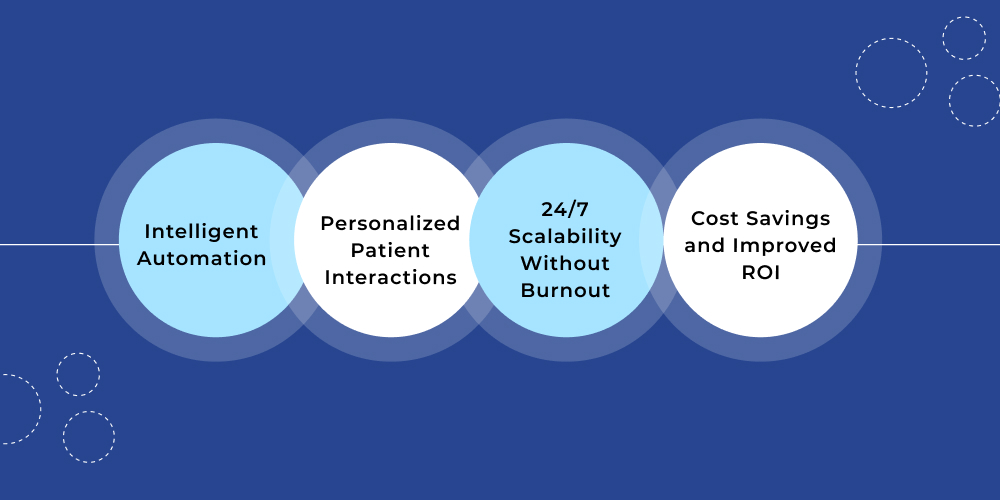
Generative AI is not just for the IT department; it also supports your business goals. Here’s how:
Intelligent Automation
Automate repetitive and manual tasks like documentation, billing summaries, or patient FAQs, reducing staff workload and human error.
Personalized Patient Interactions
Deliver customized messages, care plans, and follow-ups based on individual patient history and preferences.
24/7 Scalability Without Burnout
Unlike human staff, AI systems can operate round-the-clock, handling queries, generating reports, and assisting care teams without fatigue.
Cost Savings and Improved ROI
Whether it's fewer missed appointments, faster claims processing, or reduced admin time, generative AI contributes directly to operational efficiency and financial performance.
Whether it's a hospital, diagnostic lab, or wellness center, these generative AI in healthcare use cases can be tailored to healthcare operations.
Real-World Use Cases of Generative AI in Healthcare
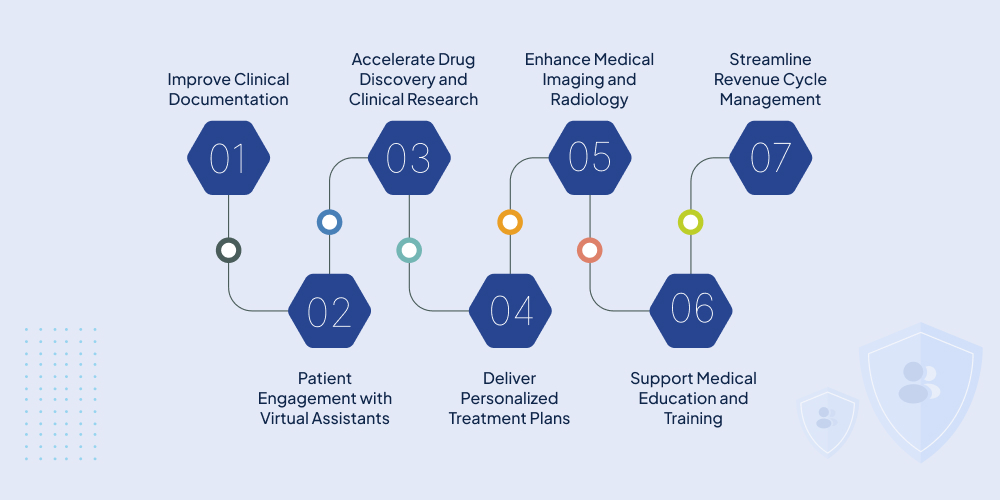
For business owners in the healthcare sector, the promise of generative AI lies in its ability to automate routine tasks, personalize care delivery, and uncover insights that improve both clinical and operational performance. Below are several real-world applications where generative AI is already creating a measurable impact.
Improve Clinical Documentation
One of the most time-consuming tasks for physicians is documenting patient encounters. Between taking notes, inputting data into electronic health records (EHRs), and complying with regulatory requirements, doctors can easily spend more time with their screens than with their patients.
Generative AI is addressing this imbalance. By listening to doctor-patient conversations and automatically generating structured clinical notes, AI systems can save hours of administrative labor per day.
Generative AI use cases in healthcare have already demonstrated success in reducing documentation time by over 50%, allowing physicians to focus more on care while improving the accuracy and consistency of medical records.
Patient Engagement with Virtual Assistants
Hospitals and clinics often struggle to manage patient communication efficiently. Generative AI-powered virtual assistants are filling this gap by offering intelligent, always-on engagement. These systems can handle everything from appointment scheduling and medication reminders to answering frequently asked questions and even triaging symptoms.
Unlike traditional chatbots, these assistants are context-aware and conversational, offering human-like responses that adapt based on a patient’s history or concern. For example, a popular clinic has successfully integrated conversational AI into its digital front door, improving access and patient satisfaction while reducing administrative burden on support staff.
Accelerate Drug Discovery and Clinical Research
The process of developing new drugs is notoriously expensive and time-intensive for research companies and drug manufacturers. Generative AI is accelerating this timeline by proposing novel compounds, modeling chemical interactions, and predicting outcomes before any real-world experiments begin.
In one striking example, a drug manufacturer used generative AI to develop a drug candidate in just 46 days, a fraction of the traditional R&D cycle. For healthcare businesses and biotech startups, this technology offers a chance to innovate faster, reduce costs, and enter markets with groundbreaking therapies ahead of the competition.
Deliver Personalized Treatment Plans
Every patient is unique, yet many healthcare organizations still rely on standardized protocols. Generative AI enables a more tailored approach by analyzing vast datasets, including EHRs, lab results, medical literature, and real-time patient data, to generate personalized treatment plans. This empowers physicians with AI-assisted insights that go beyond the scope of individual expertise.
For example, an AI system could suggest an optimized diabetic therapy regimen based on a patient’s genetic profile, lifestyle factors, and response to past treatments. This level of personalization not only improves outcomes but also improves the quality of care, which is increasingly tied to reimbursement and patient retention metrics.
Enhance Medical Imaging and Radiology
Generative AI is also making significant strides in radiology by reconstructing and enhancing medical images such as MRIs and CT scans. These models can fill in missing data, correct artifacts, and even highlight abnormalities that may be difficult for the human eye to detect. The result is faster, more accurate diagnoses and fewer repeat imaging procedures.
This not only improves the patient experience but also optimizes the use of expensive imaging equipment, helping healthcare facilities increase throughput without compromising quality. For business owners operating imaging centers or radiology services, this means greater efficiency and better ROI on technology investments.
Support Medical Education and Training
Educational platforms are using AI to simulate lifelike patient scenarios, complete with variable symptoms, histories, and emotional states. Trainees can interact with these virtual patients in real-time, receiving feedback and adapting their approach in a safe, controlled environment.
AI can also generate detailed explanations and rationales, turning training into a more interactive and immersive process. For institutions and private training providers, this represents a scalable, cost-effective alternative to traditional clinical rotations and standardized patients.
Streamline Revenue Cycle Management
Administrative inefficiencies often lead to delayed reimbursements, denied claims, and mounting overhead. Generative AI is helping revenue cycle management for teams by drafting appeal letters, summarizing complex medical documentation, and even identifying coding errors before submission.
These systems not only improve the speed and accuracy of claims processing but also reduce the need for expensive manual reviews. For healthcare businesses operating in tight margin environments, AI-driven automation in billing and coding can lead to significant cost savings and faster cash flow.
Eliminate Data Chaos With Clean, Connected Intelligence!
DITS helps you centralize data from silos, reduce redundancies, and power smarter, real-time decisions across departments.
How DITS Helps You Integrate AI into Healthcare Solutions
At DITS, we specialize in helping healthcare businesses implement generative AI in healthcare use cases that are compliant, effective, and scalable. Our team builds AI-driven solutions that are compliant, effective, and tailored to your workflows for companies across various industries, including healthcare, transportation, ed-tech, and retail.
We help you integrate generative AI into existing platforms like Electronic Health Records (EHRs), Hospital Information Systems (HIS), and other core applications, without disrupting ongoing operations. This ensures smoother adoption and faster ROI across all healthcare operations in your business.
From AI-powered chatbots and documentation tools to predictive analytics, we build tailor-made generative AI softwares that address your clinical and administrative needs.
We understand the healthcare regulatory standards for a variety of locations in the United States and other countries. Our AI integration services prioritize HIPAA, GDPR, and local compliance standards, ensuring data remains secure, anonymized, and ethically handled throughout the pipeline.
Whether you're just exploring AI or ready to deploy at scale, we offer full lifecycle support:
- Feasibility assessment
- AI model selection or development
- UI/UX and workflow integration
- QA Testing, validation, and compliance
- Training and post-launch optimization
From concept to compliance, DITS team will work with you at every stage of the AI journey. Our solutions are designed to integrate conveniently with your existing systems and workflows.
Conclusion
Generative AI is rapidly transforming healthcare by streamlining operations, improving patient care, and opening new possibilities for growth and innovation. From AI-generated clinical notes to intelligent virtual assistants and accelerated drug discovery, the real-world use cases of generative AI in healthcare are not just promising—they’re already delivering measurable results. One notable example is the application of generative AI in drug discovery, where it’s streamlining compound identification, reducing research timelines, and enabling more targeted therapeutics.. By integrating tailored AI solutions, organizations can drive efficiency, improve outcomes, and stay ahead in a technology-driven market. The future of healthcare is intelligent, adaptive, and generative, and now is the time to lead the change.
FAQs
1. What is generative AI in healthcare?
Generative AI in healthcare refers to the use of AI models that can create new content—such as clinical notes, images, or treatment plans—by learning from existing medical data. It enhances automation, decision-making, and patient care.
2. What is the purpose of generative AI in healthcare?
The purpose of generative AI is to improve efficiency, reduce administrative burden, and deliver personalized care. It automates repetitive tasks and supports clinicians with real-time insights.
3. How is generative AI being used in healthcare?
It’s used for auto-documentation, virtual assistants, drug discovery, imaging analysis, revenue cycle management, and medical education—making it one of the most versatile tools in modern healthcare.
4. What are the risks of generative AI in healthcare?
Risks include biased outputs, clinical inaccuracies, lack of explainability, and regulatory challenges. These can be mitigated through human oversight, model validation, and robust compliance frameworks.
5. What is the generative AI in healthcare market forecast?
The global market is projected to grow from $1.2 billion in 2023 to over $17 billion by 2032, driven by widespread adoption across hospitals, pharma, diagnostics, and med-tech sectors.
6. What is the future of generative AI in healthcare?
Generative AI is set to become an integral part of healthcare’s digital infrastructure—powering everything from smart diagnostics and telemedicine to intelligent automation and population health analytics.

Nidhi Thakur
With more than 19 years of experience - I represent a team of professionals that specializes in the healthcare and business and workflow automation domains. The team consists of experienced full-stack developers supported by senior system analysts who have developed multiple bespoke applications for Healthcare, Business Automation, Retail, IOT, Ed-tech domains for startups and Enterprise Level clients.
Recent Posts
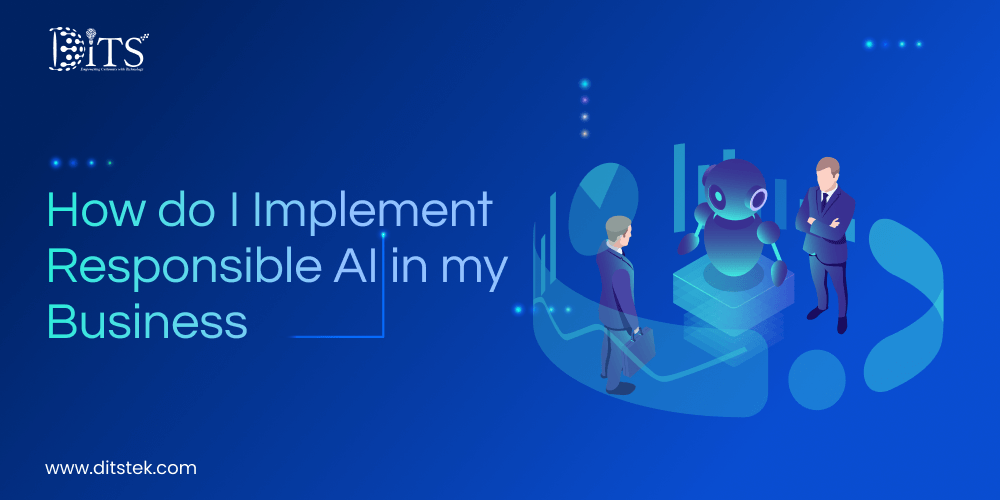
A practical guide explaining how to implement AI in business with responsible governance, secure integration, scalable architecture, and measurable operational impact across industries.
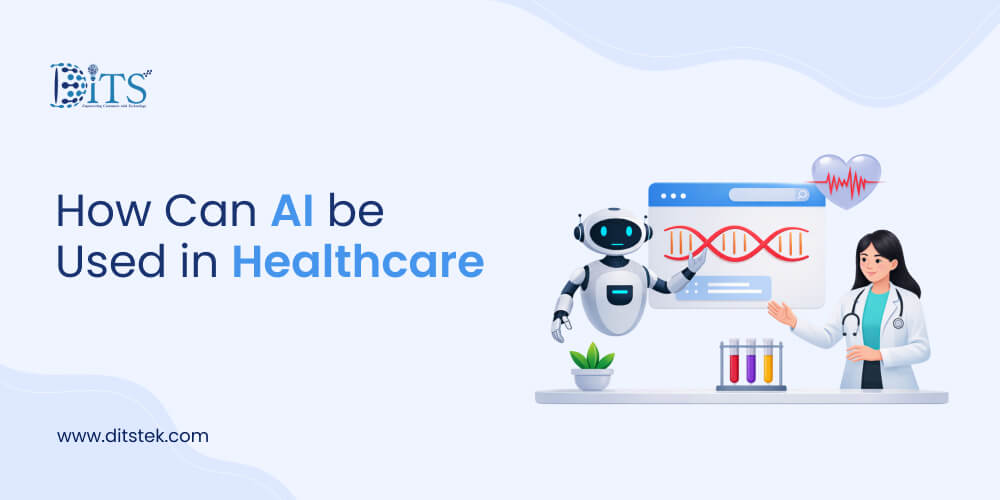
Explore how AI can be used in healthcare to improve diagnostics, automate operations, enhance revenue cycles, and deliver measurable performance outcomes across healthcare organizations.

Building health tech that actually works? Healthcare API integration makes EHR access, FHIR compliance, and real-time syncing possible. Here’s why it’s non-negotiable.